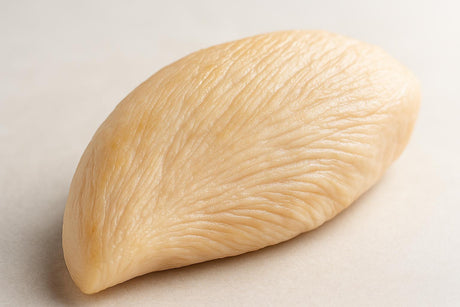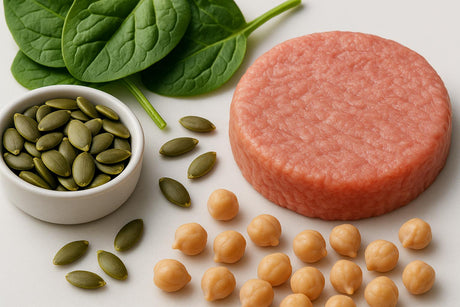Cultivated meat, grown from animal cells, offers a consistent texture that absorbs marinades better than conventional cuts. This makes it ideal for creating flavourful, tender dishes. Here are five marinades to elevate your meals:
- Mediterranean Herb and Balsamic: A tangy mix of balsamic vinegar, olive oil, and herbs like rosemary and oregano. Best for chicken, lamb, or beef. Marinate for 1–6 hours.
- Caribbean Citrus and Spice: A tropical blend of citrus juices, allspice, and Scotch bonnet peppers. Perfect for chicken, pork, or fish. Marinate for 30 minutes to overnight.
- Korean Gochujang: A savoury and spicy marinade with fermented chilli paste, soy sauce, and sesame oil. Great for beef, pork, or chicken. Marinate for 30 minutes to 4 hours.
- White Wine and Rosemary: A simple mix of dry white wine, fresh rosemary, and garlic. Ideal for chicken, lamb, or pork. Marinate for 1–4 hours.
- Sweet Soy and Ginger: Balances soy sauce, ginger, and brown sugar for a sweet and savoury profile. Works well with chicken, pork, beef, or duck. Marinate for 30 minutes to 12 hours.
Each marinade is easy to prepare, uses everyday ingredients, and enhances the natural taste of cultivated meat. Whether you're grilling, roasting, or stir-frying, these recipes can make your meals stand out. For more tips, visit Cultivated Meat Shop.
6 EASY Chicken Marinades That ACTUALLY Taste Good
1. Mediterranean Herb and Balsamic Marinade
This Mediterranean Herb and Balsamic Marinade combines tangy balsamic vinegar with aromatic herbs to bring out the best in Cultivated Meat. It’s a versatile option, perfect for anything from quick weeknight meals to relaxed weekend gatherings.
Key Ingredients
To create this marinade, you’ll need:
- 60ml extra virgin olive oil
- 30ml balsamic vinegar
- 2 minced garlic cloves
- 1 tbsp each of chopped fresh rosemary and oregano
- 1 tsp lemon zest
- 1 tsp honey
- Salt and freshly ground black pepper to taste
If you’ve got fresh herbs on hand, they’ll add a vibrant touch, but dried herbs work just as well and are a practical choice for everyday cooking. The secret is in whisking the mixture until the oil and vinegar emulsify, ensuring the flavours coat the Cultivated Meat evenly.
Flavour Profile
This marinade delivers a delightful mix of herbaceous and tangy notes. The balsamic vinegar adds a rich, slightly sweet acidity, while the olive oil provides a smooth base. Fresh garlic and herbs like rosemary and oregano round it out with their aromatic, savoury qualities.
Best Cultivated Meat Pairing
This marinade works wonderfully with cultivated chicken, beef, and lamb. Its robust herbs and tangy acidity complement the natural flavours of each protein beautifully.
Recommended Marinating Time
For the best results:
- Marinate cultivated chicken or pork for 1–4 hours.
- For beef or lamb, aim for 2–6 hours.
Use a resealable bag or a shallow dish, and make sure to turn the meat occasionally for an even soak. Before cooking, let the meat rest at room temperature for 15–20 minutes to ensure even cooking.
Next up: a zesty Caribbean Citrus and Spice Marinade to add some tropical flair!
2. Caribbean Citrus and Spice Marinade
Bring a taste of the tropics to your cultivated meat with this Caribbean Citrus and Spice Marinade. Packed with tangy citrus, warm spices, and just the right amount of heat, it delivers that unmistakable island-inspired flair.
Key Ingredients
This marinade captures the essence of Caribbean cooking with these vibrant ingredients:
- Freshly squeezed juice from 2 limes and 1 orange
- 2 tbsp soy sauce
- 1 tbsp brown sugar
- 2 minced garlic cloves
- 1 tsp freshly grated ginger
- 1 finely chopped Scotch bonnet pepper (adjust for heat preference)
- 1 tsp ground allspice
- 1 tbsp chopped fresh thyme
- 2 tbsp olive oil
Whisk everything together until the sugar dissolves. If you prefer a milder heat, reduce the Scotch bonnet or swap it for a jalapeño. For a gluten-free version, tamari is an excellent substitute for soy sauce.
Flavour Profile
This marinade delivers bold, sun-kissed flavours that are unmistakably Caribbean. The fresh citrus juice provides a tangy, zesty base, while allspice brings a warm, peppery depth. The Scotch bonnet adds a fiery kick with a touch of fruity sweetness, perfectly balanced by the brown sugar.
Fresh thyme and ginger layer in aromatic, herbal notes, and garlic rounds it all out with a savoury richness. The result? A marinade that’s bright, spicy, and full of character - a true celebration of Caribbean cuisine.
Best Cultivated Meat Pairing
This marinade works wonders with cultivated chicken and pork. The citrus and spices enhance their mild flavours, while the acidity tenderises the meat beautifully. It’s also a fantastic choice for cultivated fish, though you’ll need to adjust the marinating time to suit its delicate texture.
Feeling adventurous? Try it with cultivated beef for a tropical twist that steps outside the usual flavour profiles.
Recommended Marinating Time
To get the most out of this vibrant marinade, timing is everything:
- Cultivated chicken or pork: Let it soak for 2-4 hours at a minimum, though overnight in the fridge will give you the best flavour.
- Cultivated fish: A quick 30-60 minutes is enough to avoid overpowering its delicate texture.
Always use a glass or ceramic dish to marinate, as the citrus can react with metal containers. For thicker cuts of meat, score the surface lightly to help the marinade penetrate deeper.
Before cooking, let the meat sit at room temperature for about 15 minutes. Reserve some of the marinade for basting during cooking to enhance those caramelised, flavour-packed edges.
Next up, discover a Korean marinade that’s all about rich, savoury umami.
3. Korean Gochujang Marinade
Bring the vibrant flavours of Korean BBQ to your kitchen with this Gochujang Marinade, designed to complement cultivated meat. At its heart is gochujang, the famous Korean fermented chilli paste, which delivers a balanced mix of heat, sweetness, and savoury depth, turning any dish into a flavour-packed experience.
Key Ingredients
The star of this marinade is gochujang, a staple of Korean cuisine for generations. To make it, you'll need:
- 2 tbsp gochujang (Korean fermented chilli paste)
- 1 tbsp soy sauce
- 1 tbsp sesame oil
- 1 tbsp rice vinegar
- 1 tbsp brown sugar
- 2 cloves garlic, finely minced
- 1 tsp fresh ginger, grated
Mix these ingredients thoroughly until the sugar dissolves. The gochujang base, with its blend of red chilli, glutinous rice, fermented soybeans, and salt, creates a rich and complex foundation.
Flavour Profile
This marinade is all about bold, layered flavours. It's spicy yet approachable, with a touch of sweetness that balances the heat. The fermented gochujang offers a depth of umami that fresh chilli sauces simply can't match.
The sesame oil adds a subtle nuttiness, while garlic, ginger, and rice vinegar bring brightness and balance. The brown sugar ties it all together, caramelising beautifully during cooking to create a slightly smoky, sweet finish.
What sets this marinade apart is the fermented richness of the gochujang, which gives it a mature, complex character. It’s not just spicy - it’s a harmony of savoury, sweet, and tangy notes that elevate any dish.
Best Cultivated Meat Pairing
This marinade is a natural fit for cultivated beef, chicken, and pork, enhancing their clean taste with its bold flavours. It’s especially perfect for cultivated beef strips in bulgogi-style dishes, where the marinade's savoury-sweet complexity really shines.
For cultivated chicken thighs, the marinade penetrates deeply, thanks to the meat's uniform texture, creating a juicy and flavourful result. If you're in the mood for something different, try it with cultivated pork for a Korean BBQ experience that's every bit as delicious as traditional methods.
Recommended Marinating Time
For the best results, marinate your cultivated meat in the fridge for 2-4 hours. The even texture of cultivated meat ensures it absorbs the marinade quickly and evenly, so you don’t need extended marinating times.
Pressed for time? Even 30-60 minutes will infuse noticeable flavour. If you have more time, marinating overnight is fine too - cultivated meat won’t become over-marinated due to its consistent structure.
A few tips for marinating:
- Use a glass or ceramic dish to avoid any unwanted reactions.
- Turn the meat occasionally for even coverage.
- Before cooking, let the meat rest at room temperature for about 15 minutes.
- Reserve some marinade for basting during cooking to achieve those caramelised, flavourful edges that make Korean BBQ so irresistible.
Next, discover a French-inspired marinade for a sophisticated twist.
sbb-itb-c323ed3
4. White Wine and Rosemary Marinade
Bring a touch of the Mediterranean to your kitchen with this White Wine and Rosemary Marinade. The zesty brightness of dry white wine paired with the earthy fragrance of fresh rosemary creates a marinade that’s both elegant and flavour-packed - perfect for enhancing your cultivated meat dishes.
Key Ingredients
This marinade shines because of its simple yet harmonious ingredients:
- 120ml dry white wine (Sauvignon Blanc or Pinot Grigio are excellent choices)
- 2–3 sprigs of fresh rosemary, finely chopped
- 30ml extra virgin olive oil
- 2 garlic cloves, minced
- 1 tbsp fresh lemon juice
- 1 tsp sea salt
- ½ tsp freshly ground black pepper
Fresh rosemary is the star here, delivering its signature pine-like aroma. Pair it with a crisp, acidic white wine to bring out the best in the marinade. Whisk everything together until the olive oil emulsifies, ensuring the flavours are evenly distributed.
Flavour Profile
This marinade delivers a vibrant, herbaceous kick. The dry white wine introduces subtle fruity notes alongside its tenderising acidity, while rosemary adds a warm, earthy depth. Garlic contributes a savoury richness, and the lemon juice adds a sharp, citrusy edge that keeps the flavours lively. Together, these ingredients create a balanced, nuanced profile that enhances the natural taste of cultivated meat, leaving it tender and full of character.
Best Cultivated Meat Pairing
This marinade is incredibly versatile but pairs particularly well with cultivated chicken, pork, and lamb. For chicken breasts, the wine tenderises beautifully while rosemary infuses the meat with its aromatic essence. Cultivated pork benefits from the European sophistication of this blend, making it a great choice for a Sunday roast or a special dinner. Feeling adventurous? Try it with cultivated lamb - rosemary and white wine are a classic duo that highlights the richness of lamb. Even cultivated beef can shine with this marinade, especially cuts destined for grilling, as the herbs form a delicious crust when cooked.
Recommended Marinating Time
Timing is key to getting the most out of this marinade. For cultivated chicken or pork, 1–2 hours in the fridge is enough to lock in the flavours. For lamb or beef, aim for 2–4 hours to allow the marinade to penetrate deeply. Avoid marinating overnight, as the wine’s acidity can alter the texture. Before cooking, pat the meat dry to ensure proper browning and that irresistible caramelised finish.
Coming up next, discover an Asian-inspired marinade that blends sweet and savoury notes for a whole new flavour experience.
5. Sweet Soy and Ginger Marinade
The Sweet Soy and Ginger Marinade combines a rich umami base with hints of warmth and caramelised sweetness, making it a standout choice for enhancing cultivated meat dishes. Inspired by Asian flavours, this marinade creates glossy, flavour-packed results, perfect for anything from casual weeknight meals to elegant dinner parties.
Key Ingredients
This recipe uses a handful of simple yet flavourful ingredients:
- 60ml soy sauce (swap for tamari if you need a gluten-free option)
- 2 tbsp fresh ginger, finely grated
- 3 garlic cloves, minced
- 2 tbsp brown sugar or honey
- 1 tbsp rice vinegar
- 1 tsp sesame oil
- 2 spring onions, finely chopped (optional)
Fresh ginger is the star here, adding warmth and a bright, aromatic kick. Grating it finely ensures every bit of its flavour is released. The brown sugar or honey helps create a caramelised crust during cooking, while rice vinegar adds a touch of acidity to balance the sweetness and tenderise the meat. Sesame oil lends a nutty richness, tying all the flavours together.
Flavour Profile
This marinade offers a sweet, savoury, and aromatic balance that makes every bite memorable. The soy sauce provides a deep, umami base, complemented by the gentle heat and zest of fresh ginger. Brown sugar or honey adds a natural sweetness that caramelises beautifully, creating a glossy finish. The rice vinegar introduces a slight tang to cut through the richness, while sesame oil adds a subtle, nutty depth. Together, these elements create a marinade that’s both vibrant and well-rounded.
Best Cultivated Meat Pairing
This versatile marinade pairs beautifully with cultivated chicken, pork, beef, and even duck. Cultivated chicken soaks up the sweet and savoury notes effortlessly, making it ideal for stir-fries or grilling. The marinade’s umami depth is a perfect match for cultivated pork, especially for dishes that highlight caramelised textures. For cultivated beef, the tenderising effects of soy sauce and vinegar shine, while the ginger adds a fragrant complexity. And with cultivated duck, the marinade’s sweetness balances the richness of the meat, creating a truly satisfying dish.
Recommended Marinating Time
To get the best results, marinate your meat for at least 30 minutes. For deeper flavour, aim for 2–4 hours, or up to 12 hours for thicker cuts. However, avoid marinating for too long, as it can affect the texture. Before cooking, pat the meat dry to ensure proper browning and that irresistible caramelised finish.
Compare all five marinades in the table below to find the one that suits your dish best.
Marinade Comparison Table
Here’s a handy guide to help you pick the perfect marinade for your Cultivated Meat dish:
| Marinade Name | Key Ingredients | Flavour Profile | Best Cultivated Meat Pairing | Recommended Marinating Time |
|---|---|---|---|---|
| Mediterranean Herb and Balsamic | Balsamic vinegar, olive oil, garlic, oregano, thyme, rosemary | Herbaceous, tangy, slightly sweet | Chicken, lamb | 2–4 hours (chicken), 4–6 hours (lamb) |
| Caribbean Citrus and Spice | Lime juice, orange juice, garlic, chilli, allspice, fresh coriander | Bright, spicy, aromatic | Chicken thighs, pork | 2–4 hours |
| Korean Gochujang | Gochujang paste, soy sauce, garlic, ginger, sesame oil, brown sugar | Spicy, umami-rich, slightly sweet | Beef strips, pork belly | 1–2 hours |
| White Wine and Rosemary | White wine, fresh rosemary, garlic, olive oil, lemon zest | Fresh, herbal, subtly acidic | Lamb, chicken | 2–4 hours |
| Sweet Soy and Ginger | Soy sauce, fresh ginger, garlic, brown sugar, rice vinegar, sesame oil | Sweet, savoury, aromatic | Beef, chicken | 1–2 hours |
How to Choose the Right Marinade:
- If you’re after bold, herb-driven flavours, Mediterranean Herb and Balsamic is your go-to.
- For a tropical kick with a bit of spice, try the Caribbean Citrus and Spice marinade.
- Craving umami? The Korean Gochujang marinade packs a flavourful punch.
- For a light, elegant touch, White Wine and Rosemary is a great choice.
- Need versatility? Sweet Soy and Ginger pairs beautifully with almost anything.
Cooking Methods to Match:
- Mediterranean Herb and Balsamic and White Wine and Rosemary shine when grilling or roasting, as the heat enhances their herbal and acidic notes.
- Caribbean Citrus and Spice and Korean Gochujang are excellent for pan-frying or stir-frying, bringing out their vibrant flavours.
- Sweet Soy and Ginger is the all-rounder, working well with any cooking method.
For more cooking inspiration, visit Cultivated Meat Shop.
Conclusion
These marinades bring a fresh twist to cultivated meat, transforming its mild flavour into bold and vibrant dishes. Whether it’s the herb-packed Mediterranean blend or the spicy kick of Korean gochujang, each recipe shows how traditional seasoning methods pair beautifully with the consistent quality of cultivated meat.
What stands out is how these recipes underline the adaptability of cultivated meat while addressing common cooking challenges. Instead of overpowering the meat, these marinades enhance its natural qualities, creating meals that celebrate both flavour and modern food innovation.
Marinating cultivated meat is straightforward and delivers results that could rival any restaurant dish. With everyday ingredients like olive oil, garlic, and fresh herbs, anyone can whip up something extraordinary while making a more conscious choice for the planet. These marinades not only boost flavour but also add tenderness, turning simple ingredients into unforgettable meals.
As cultivated meat continues to gain traction in UK kitchens, these recipes make it easy for home cooks to experiment with this new protein. By blending familiar cooking techniques with cutting-edge food technology, there’s an exciting chance to explore global flavours while making choices that are kinder to the environment.
These marinades are just the start of your culinary adventure with cultivated meat. Want to learn more? Head over to Cultivated Meat Shop for detailed guides, product updates, and to connect with a community shaping the future of food.
FAQs
Does cultivated meat marinate and absorb flavours differently compared to traditional meat?
Cultivated meat has a structure and composition that's quite similar to traditional meat, meaning it tends to soak up marinades and flavours in much the same way. That said, the way it absorbs flavour can vary depending on the specific product and its texture. To make the most of its potential, opt for bold marinades that pair well with its unique characteristics - think Mediterranean herbs or tangy Korean-style sauces.
Looking for inspiration? Try experimenting with marinades designed specifically to bring out the best in this innovative food option!
Can I use these marinades for other meats or plant-based proteins, and how should I adjust the marinating times?
Yes, you can absolutely use these marinades with other meats or plant-based proteins. Just keep in mind that marinating times might need tweaking depending on the texture and density of what you're using. For instance, softer options like tofu or fish often need just 15–30 minutes to soak up the flavours, whereas thicker cuts of meat might benefit from a few hours or even an overnight soak for a more intense taste.
Make sure to think about how well the ingredient absorbs the marinade, and always prioritise food safety by keeping everything refrigerated while marinating. A bit of trial and error with timing can help you nail the perfect flavour for your dish.
What are the environmental advantages of cultivated meat over traditional meat?
Cultivated meat stands out as a promising alternative to traditional meat production, especially when considering its impact on the planet. It uses far less land and water, which helps protect natural habitats and eases the pressure on these essential resources. On top of that, it generates fewer greenhouse gas emissions, playing a part in addressing climate change.
By moving away from large-scale livestock farming, cultivated meat also tackles problems like deforestation and soil degradation. This shift offers a more environmentally friendly way to meet the growing demand for meat without compromising the health of the planet.












